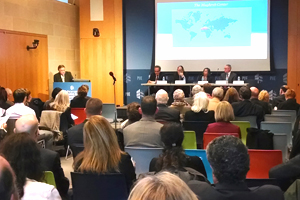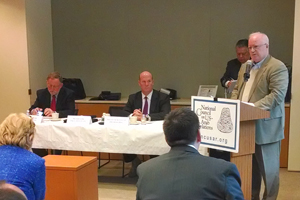Summer Intensive Language Program at The Arab-American Language Institute in Morocco

The National Council, in collaboration with The Arab-American Language Institute in Morocco (AALIM) for the summer of 2014, is pleased to announce a Summer Language Program in the Kingdom of Morocco. Students will spend six weeks in historic Meknes, Morocco taking part in intensive Arabic language instruction. Students at all levels of Arabic proficiency are encouraged to apply. The AALIM center is a host to a community of Arabic learners throughout the summer, providing for a fully immersive program. Those selected will also gain direct personal expertise in Moroccan culture, history, and society through a variety of day excursions, local outings, workshops, and demonstrations.
For more information, visit: http://bit.ly/14-aalim
2014 AALIM Application (.pdf)
Students should submit completed applications to the National Council on U.S.-Arab Relations. Applications are due April 10, 2014.
Intensive Arabic Language Programs at the Center for International Learning in Oman

The National Council is pleased to offer students a partial scholarship opportunity for intensive Arabic language study with our partner organization in Muscat, Oman, the Center for International Learning (CIL). Comprised of Americans and Omanis with PhD and Masters Degrees, the CIL faculty facilitates experiential education, cultural exchange, and comparative studies to deepen understanding, promote common interests, and explore the shared aspirations of people from different cultures. CIL offers all three levels of Modern Standard Arabic (beginner, intermediate, and advanced), as well as Omani dialect, media Arabic, and skills classes. A limited number of partial scholarships to study at CIL are available through the National Council.
For more information, visit: http://bit.ly/14-cil
2014-15 CIL Application (.pdf)
Students should submit completed applications to the National Council on U.S.-Arab Relations.
Arabic Language & Area Studies Programs in Sana’a at the Yemen College of Middle Eastern Studies

The Yemen College of Middle Eastern Studies (YCMES) is a fully accredited, non-profit college that provides students and scholars from around the world the opportunity to develop a complex knowledge of the Arabic language and the contemporary Middle East. Students can study at YCMES for 5, 10, or 15 weeks, or more — programs are tailored to meet students’ needs. Sana’a, Yemen is an ideal location for language acquisition and cultural immersion. Unlike many other Middle Eastern cities where English or French or both are pervasive, Sana’a is one of the few remaining places in the world where Arabic is spoken exclusively. In short, it is nearly impossible to remain isolated in a Western bubble.
For more information, visit:
http://ncusar.org/study-abroad/ycmes
For more information:
If you have questions or need more information about any of the National Council’s student programs you can contact the Council’s Director of Student Programs Megan Geissler (megan@ncusar.org) or Deputy Director of Student Programs Josh Hilbrand (josh@ncusar.org).



You must be logged in to post a comment.